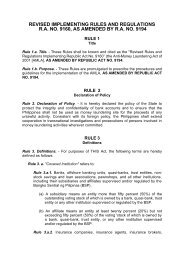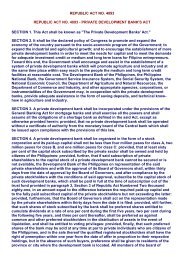Ecopreneurs - Planters Development Bank
Ecopreneurs - Planters Development Bank
Ecopreneurs - Planters Development Bank
Create successful ePaper yourself
Turn your PDF publications into a flip-book with our unique Google optimized e-Paper software.
oundtable<br />
16<br />
SME COMmunity PHilippines<br />
It’s<br />
not<br />
e a s y<br />
By tichot san pablo<br />
“It is not the strongest of the species<br />
that survives, nor the most intelligent<br />
that survives. It is the one that is the<br />
most adaptable to change.”<br />
— Charles Darwin<br />
b e i n g<br />
This insight is most relevant<br />
with today’s realization of<br />
the reality of global warming.<br />
Rajenda Pachauri, head of the<br />
Intergovernmental Panel on Climate<br />
Change (IPCC), has sounded the<br />
alarm on its dangers: “The picture is<br />
quite grim –- if the human race does<br />
not do anything, climate change will<br />
have serious impacts.”<br />
Worldwide concern<br />
Several major shifts in the earth’s<br />
climate have occurred throughout<br />
our planet’s history, resulting in<br />
the extinction of millions of plant<br />
and animal species. In contrast to<br />
these prehistoric natural upheavals,<br />
the present global climate change<br />
has been brought about by human<br />
activity. And humanity is now reeling<br />
from its effects. Achim Steiner,<br />
UN Under-Secretary General and<br />
Executive Director of The United<br />
Nations Environment Programme<br />
g r e e n<br />
© Prawny Dreamstime.com<br />
(UNEP), said: “The financial, fuel<br />
and food crises of 2008 are in part a<br />
result of speculation and a failure of<br />
governments to intelligently manage<br />
and focus markets. But they are<br />
also part of a wider market failure<br />
triggering ever deeper and disturbing<br />
losses of natural capital and naturebased<br />
assets coupled with an overreliance<br />
of finite, often subsidized<br />
fossil fuels.”<br />
Recently, UNEP launched a<br />
Green Economy initiative which will<br />
propose recommendations for making<br />
national economies more environment<br />
friendly, creating new green jobs and<br />
greening existing jobs. By combating<br />
climate change and re-investing in<br />
natural infrastructure, the initiative<br />
expects to realize economic, social<br />
and environmental benefits. More and<br />
more future jobs are expected to shift<br />
to environmental industries such as<br />
environmental infrastructure, clean<br />
and efficient technology, renewable<br />
energy, bio-diversity based products<br />
and services such as organic foods,<br />
chemical and waste management,<br />
and ecologically friendly buildings,<br />
construction and transport systems.<br />
What businesses can do<br />
Sadly, most businesses still see<br />
environmental initiatives as a business<br />
cost. However, this is expected to<br />
change, as more and more consumers<br />
consider corporate environmental<br />
policies in their buying decisions.<br />
This will put pressure on companies<br />
to go green. Moreover, companies<br />
that look at green initiatives as a<br />
business opportunity will have a<br />
distinct advantage over those that do<br />
business the traditional way.<br />
Business leaders must analyze<br />
which areas of their business<br />
have the greatest environmental<br />
impact. This will form the basis<br />
for prioritizing green efforts. What<br />
natural resources are being used<br />
Are there viable alternative sources<br />
How can goods and services be better<br />
produced How can the company<br />
save on energy What alternative<br />
packaging materials are available<br />
What recycling initiatives can the<br />
business implement<br />
Small and medium enterprises<br />
(SMEs), in particular, find it difficult<br />
to implement a major shift to green<br />
business. The transition need not<br />
be done in one huge step; it is much<br />
easier to implement small coordinated<br />
changes, such as:<br />
• Using recycled items such<br />
as paper, plastic, packaging<br />
materials, etc.<br />
• Managing company waste<br />
• Saving on electricity<br />
• Encouraging car pools, the use<br />
of mass transport systems and<br />
bicycles<br />
• Educating employees on the<br />
importance of greening<br />
• Coordinating with<br />
environmental organizations or<br />
experts

















